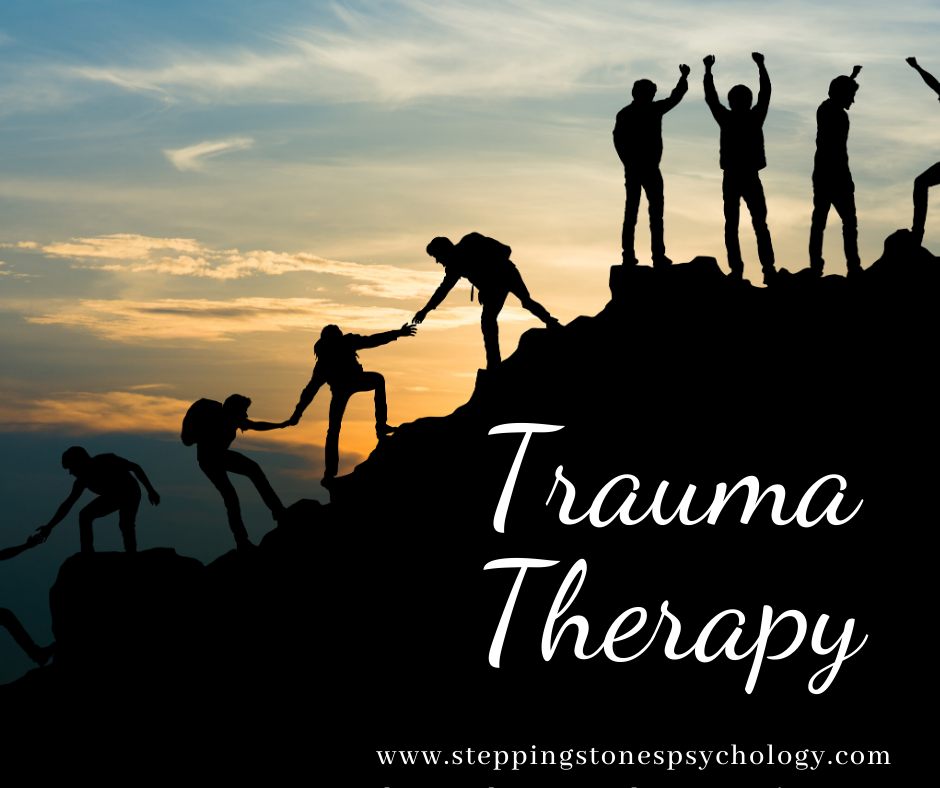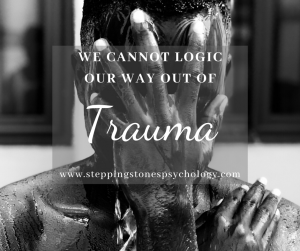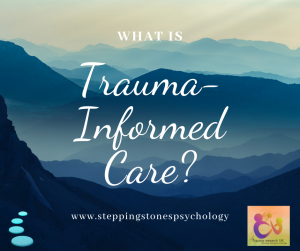This blog is an integration and follow-up of the blog by Nic Jonwik Strang, founder of CPTSD & PTSD Research. The following blog will focus on therapy options for trauma survivors.
Complex trauma or Complex PTSD can develop as a result of repeated or on-going traumatic events. Complex trauma can happen at any time in our life, however, for the purpose of this blog, the focus will be on attachment trauma related to childhood abuse or neglect.
The NHS currently uses Cognitive Behavioural Therapy (CBT) as a blanket approach to treating mental illness or emotional difficulties. However in recent years, trauma specialists have argued that the use of this therapy alone is ineffective in treating trauma and a multi-level approach is needed. Trauma-informed therapy is gaining more recognition as trauma researchers examine and interpret their findings, which repeatedly show that a holistic approach, which includes both somatic-based and subconscious-based healing, is needed.
CBT is most commonly used in NHS and although it has its benefits, it is also very limiting when working with trauma, especially when it comes to relational/complex trauma stemming from childhood trauma. More recently the NHS has started to introduce EMDR when working with trauma survivors, but this is something that most trauma survivors with CPTSD report that they were never offered. EMDR is trauma therapy and has shown to have great benefits in reducing trauma triggers, however, it was originally included as evidence-based guidelines for the treatment of PTSD, which is usually the result from a single event trauma. EMDR alone will not be sufficient when working with complex trauma.
For survivors with chronic, multiple, complex and repeated traumas which took place at various ages and developmental stages, the difficulties they suffer from appear to be far more complicated and interpersonal than for those suffering from single event traumas or relational traumas that took place in their adult life. In the case of complex trauma, the symptoms tend to be driven by foundational experiences which remove feelings of personal and environmental safety perpetrated by those exact people who meant to protect them, or those who they were meant to trust and feel safe with. The traditional EMDR model does not take all this into account, such as how complex developmental trauma manifests into adulthood.
I have repeatedly and on an on-going basis met people both in my personal and professional life, including clients, who share their disappointments about how they feel they have been let down by the system. Often they have had a past experience of having been referred to a counsellor or CBT Therapist and felt that this experience has either been limiting or negative.
Counselling can be beneficial in helping clients making sense of their thoughts and feelings in general, and to make ones story feeling heard. If you are seeking a safe space to feel heard and seen, counselling is very helpful. However, if you are seeking for help navigating something complex like trauma in a safe way with minimal risk of getting dysregulated and destabilised, then this is unlikely to be an effective method of treatment. Counselling can unintentionally end up doing more harm than help in this situation. People often report that they received very little benefit, and could, at worst, come away with a sense of toxic shame and guilt. As a result of destabilisation, they end up getting worse rather than moving forward. They are then left to feel that there is something wrong with them.
Counsellors often tend to use a person-centred approach (PCT) which focuses on the conscious mind and what is going on in the here-and-now. According to PCT, the quality of the relationship is the centre of the therapeutic work, and it involves listening and reflecting back, which can be an incredibly fertile ground for healing. A strong belief held by PCT is also that clients are the real experts. There is nothing limiting about one using person-centred values in their therapeutic work with clients, however it is concerning to allow the whole therapeutic work to be led by the client as the expert, especially when there has been developmental trauma. How can one want to work on their implicit and somatic memories if they did not know that they had these in the first place? What about when the client wants to give a detailed narrative about their trauma, which without the relevant therapeutic tools, they end up becoming destabilised? Safety and stabilisation are essential parts of trauma work, ensuring that clients can tolerate the trauma narrative and minimise the risk of retraumatising and destabilising them. It is also important to remember that being trauma-informed does help, however being a therapist or counsellor who advertises themselves as being trauma-informed, does not mean that they are a trauma therapist or that they do have the sufficient skills required to do complex trauma work. On the other hand, I also know of counsellors who engage in additional trauma therapy training and then are able to adapt to meet the needs of trauma survivors.
Complex trauma or C-PTSD is a complicated, but specialist area of work. Therefore, unless a counsellor has undertaken additional trauma-specific training, they would not have the specialist skills, knowledge and experience to work with something as complex as trauma.
Another common problem which often gets reported is that CBT sessions are generally limited to a block of 6, with only some being lucky enough to have more. Finally, we now know that trauma is stored in the body, and that part of the healing process that takes place is by using our body to process and release the trauma stored within. However, somatic approaches to trauma healing, which is therefore such a crucial part of any trauma work, would never or rarely have been explored or become part of the therapy plan.
Stories like these both anger and frustrate me. I did my doctorate training many years ago now and my doctoral research was on complex trauma/Complex PTSD; exploring what was lacking in terms of intervention and support. We are now in the 21st Century and there is still such a huge knowledge gap when it comes to trauma therapy. I am on a mission to change this and try my best to utilise various trauma-informed approaches in therapy and within the therapeutic services that I offer. I want to continually learn and improve my approach as best as I can, because I believe that as a trauma therapist I owe it to those living with trauma to facilitate their healing journey.
So there are few things I have done as a way of working on my mission and vision. I will share a little about this.
I have put my heart and soul into trauma healing work ever since I started my career path and this new project is something I had on my mind for some time now. I didn’t exactly know it was going to come to this, but I had visualised and held hope that someday there will be a holistic support service for people who have had a difficult childhood or a history of trauma. A support service that covers everything and offers many different types of support. I am so happy that it is finally here. I would like to make sure it reaches as many as possible. As most of the support will be offered virtually, it would mean that it will be accessible to both the national and global community.
One of the therapeutic services that I offer which is very specific to trauma is a 6-weeks programme for parents who have experienced trauma. The participants were so happy with it that they requested us to carry on, and we are now in Level 3 of this programme! Growing up in trauma, you survived by shutting your emotions down, but when you become an adult and have children, this is when it hits you hard: Our children can be our biggest triggers. Our children are, on a very unconscious level, reminding us of what we didn’t really have ourselves when we were children. For many years, we most likely blocked our unmet needs out by burying them away deeply. We know that the issue of attachment disruption, unresolved loss and trauma can have a negative impact on our parenting. However, having a safe space to explore and make sense of these, and looking at various trauma-informed parenting and self-help techniques, tools and resources, can help you move forward in your parenting journey. By healing yourself, you will become a better version of yourself as a parent.
Another service I am currently in the midst of working on is a unique holistic support service for people who have had a difficult childhood or a history of trauma. It will be a therapeutic support service that covers everything and will offer many different types of support. It will involve a membership package that will be complemented by coaching, counselling, therapy, therapeutic group sessions (workshops/programmes), and retreats. All of this will be both trauma-informed and attachment-based. The membership will give the members access to a very unique package which is carefully planned to meet the needs of trauma survivors and will cover topics, therapeutic activities and interventions in areas which you would like to either work on or like to make sense of.
The dedicated trauma-informed services will include talks, workshops and therapeutic activities. These will consist of a wide range of topics, but all related to issues which trauma survivors generally suffer from. Plus, members can let us know if there are any topics that they would particularly like me to cover and I will look into that too.
Some of the sessions will be offered by me. However, several of them will also be delivered by our associates and guest speakers, whose practice is aligned with the mission, vision and values of Stepping Stones Psychology, which includes being both trauma-informed and attachment-based. Each and every one of them will bring in their own set of expertise. Each and every one of us in our team is trauma-informed and many of us have a history of trauma ourselves.
I am acutely aware that specialist trauma therapy and therapeutic services are not commonly accessible through the NHS or any other free services. This means that often those who are the most in need of this service are the ones who do not get access to it due to their underprivileged or disadvantaged circumstances. This is one of the main reasons why I ensure to offer a limited number of free and discounted spaces to those who are committed to attending our events but are unable to due to their financial situation. I will continue to offer this, however, as a business, I cannot afford to offer this on a high demand basis. I have therefore created a Bursary Fund which is a ‘pot of money’ that we keep for people who want to access our services, but who cannot afford it due to genuine financial difficulties. This will allow anyone to make a donation to the fund which will then go towards the access to our services for those who cannot afford it.
Nic is researching into better support services for trauma survivors. Those of you who feel comfortable to have an opportunity to share your experiences with her in relation to the support and therapy you have received when it comes to your trauma healing. Please don’t share any information about your trauma history, only information about your therapy experience, and this does not need to be detailed. Providing something brief to give us a general picture will be more than enough and will minimise any risk of you getting triggered or destabilised. To let us know what is lacking and how can we fill that gap, email Nic at: Alexnicola4@gmail.com
I would also be interested to know if there is anything that you would like us to offer here at Stepping Stones Psychology to support trauma survivors or perhaps we are already offering it but you would like us to offer more of this.
All of this would really help both Nic and myself to think about how we can make a difference in the field of trauma work and support. Many thanks in advance.
Specialist Trauma Therapeutic Services: To find out more about the trauma-informed therapeutic services offered by Stepping Stones Psychology, please follow this link: https://steppingstonespsychology.com/events/
Specialist Trauma Therapy: To find out more about specialist trauma therapy by Stepping Stones Psychology, please follow this link: https://steppingstonespsychology.com/specialist-trauma-therapy/
Specialist Trauma and cPTSD Therapeutic Membership Package: To find out more about the membership for a Specialist trauma and C/PTSD Therapeutic Support Package. , please join our private Facebook group: www.facebook.com/groups/PTSDandTraumaSupportPackage/
Research for CPTSD, PTSD and Trauma: To support and partake in a UK-based research for survivors of trauma, PTSD and CPTSD, please follow CPTSD & PTSD Research UK via this link: https://www.facebook.com/groups/2348717965433957/
Vision & Mission of CPTSD & PTSD Research UK: This group involve research and resources, including some excellent trauma-informed blogs. CPTSD & PTSD Research UK is found by Nic Jonwik Strang, and you can read more about her story, vision and mission here: https://blog.ptsdresearchuk.co.uk/2020/06/about.html
©2020 Stepping Stones Psychology. All Rights Reserved





Such a well laid out, concise description of the complexities of the trauma across a lifetime, and the difficulties in accessing suitable help. Thank you for writing this, Sharmi.